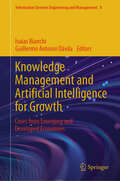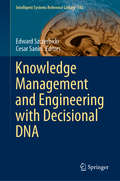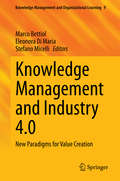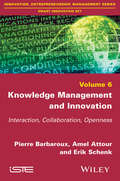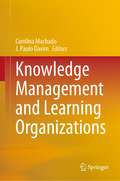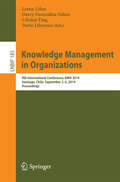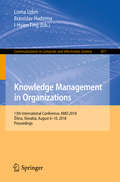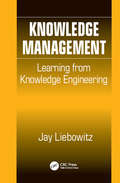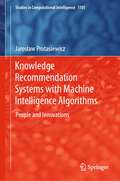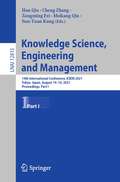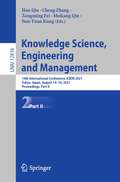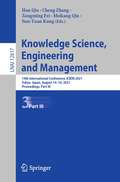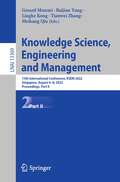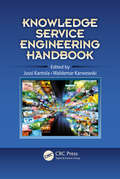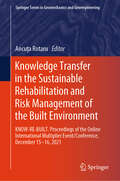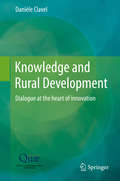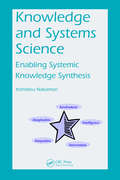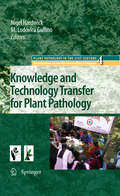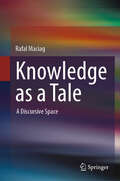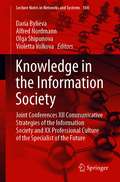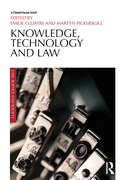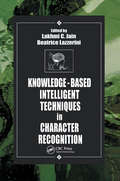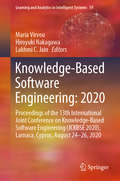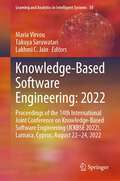- Table View
- List View
Knowledge Management and Artificial Intelligence for Growth: Cases from Emerging and Developed Economies (Information Systems Engineering and Management #8)
by Isaias Bianchi Guillermo Antonio DávilaThis book delves into the intersection of Knowledge Management (KM) and Artificial Intelligence (AI). It explores their applications, challenges, and opportunities across various industries and regions. The approach is comprehensive, drawing insights from experts worldwide. The book offers fresh perspectives on using KM and AI as powerful tools for driving business success. It covers research opportunities, real-world case studies, and empirical investigations. Notably, it emphasizes the unique context of knowledge management in the southern hemisphere. The book spans a broad range of subjects, including knowledge absorption capacity as an internationalization driver, quality certification methods in the health sector, and the role of intellectual capital in Argentine tech companies. It also delves into machine learning techniques for property price estimation in Brazil and identity document verification in Peru. Professionals, scholars, and policymakers navigating the complex integration of KM and AI will find this book invaluable. By combining theoretical foundations with practical findings, it equips readers with the knowledge and tools needed for sustainable growth within their organizations.
Knowledge Management and Engineering with Decisional DNA (Intelligent Systems Reference Library #183)
by Edward Szczerbicki Cesar SaninThis is the first book on experience-based knowledge representation and knowledge management using the unique Decisional DNA (DDNA) technology. The DDNA concept is roughly a decade old, and is rapidly attracting increasing attention and interest among researchers and practitioners. This comprehensive book provides guidelines to help readers develop experience-based tools and approaches for smart engineering of knowledge, data and information. It does not attempt to offer ultimate answers, but instead presents ideas and a number of real-world case studies to explore and exemplify the complexities and challenges of modern knowledge engineering issues. It also increases readers’ awareness of the multifaceted interdisciplinary character of such issues to enable them to consider – in different ways – developing, evaluating, and supporting smart knowledge engineering systems that use DDNA technology based on experience.
Knowledge Management and Industry 4.0: New Paradigms for Value Creation (Knowledge Management and Organizational Learning #9)
by Eleonora Di Maria Marco Bettiol Stefano MicelliThe book discusses the opportunities and challenges of managing knowledge in the new reality of Industry 4.0. Addressing paradigmatic changes in value creation due to the development of digital technologies applied to manufacturing (additive manufacturing, IoT, robotics, etc.), it includes theoretical and empirical contributions on how Industry 4.0 technologies allow firms to create and exploit knowledge. The carefully selected expert contributions highlight the potential of these technologies in acquiring knowledge from a larger number of sources and examine approaches to innovation, organization of activities, and stakeholder development in the context of this next industrial revolution.
Knowledge Management and Innovation: Interaction, Collaboration, Openness
by Amel Attour Pierre Barbaroux Erik SchenkThis book explores the relationships between knowledge management (KM) processes and innovation management. The geographical extension of markets and intensification of competition have led firms to experiment with novel approaches to innovation. New organizational forms emerged in which firms collaborate with various stakeholders to create, absorb, integrate and protect knowledge. This book explores how knowledge management processes evolve with firms' implementation of interactive, collaborative and open innovation models and it identifies the various knowledge types and processes involved throughout the different phases of the innovation process. The authors provide operational typologies for understanding innovative firms' capabilities and knowledge management practices and also discuss the main properties of four models of interactive innovation, namely open innovation, user-centric innovation, community-based innovation and crowdsourcing.
Knowledge Management and Learning Organizations
by J. Paulo Davim Carolina MachadoThis book focuses on knowledge management and learning organizations, showing how they realise entrepreneurship and innovation. Understanding knowledge management as the process of creating, sharing and managing an organization’s information and knowledge, and focusing learning organizations in their collaborations to promote continuous learning are two issues that are critical to the organizational success. As such, this book offers insights into the topic and the appropriate use of the tools and strategies that drive competitive organizations operating on an international or transnational scale.
Knowledge Management in Organizations
by Lorna Uden I-Hsien Ting Darcy Fuenzaliza Oshee Dario LiberonaThis book contains the refereed proceedings of the 9th International Conference on Knowledge Management in Organizations (KMO) held in Santiago, Chile, during September 2014. The theme of the conference is "Knowledge Management to Improve Innovation and Competitiveness through Big Data. " The KMO conference brings together researchers and developers from industry and academia to discuss and research how knowledge management using big data can improve innovation and competitiveness. The 39 contributions accepted for KMO 2014 were selected from 89 submissions and are organized in sections on: big data and knowledge management, knowledge management practice and case studies, information technology and knowledge management, knowledge management and social networks, knowledge management in organizations, and knowledge transfer, sharing and creation.
Knowledge Management in Organizations: 13th International Conference, KMO 2018, Žilina, Slovakia, August 6–10, 2018, Proceedings (Communications in Computer and Information Science #877)
by Lorna Uden I-Hsien Ting Branislav HadzimaThis book contains the refereed proceedings of the 13th International Conference on Knowledge Management in Organizations, KMO 2018, held in Žilina, Slovakia, in August 2018. The theme of the conference was "Emerging Research for Knowledge Management in Organizations."The 59 papers accepted for KMO 2018 were selected from 141 submissions and are organized in topical sections on: Knowledge management models and analysis; knowledge sharing; knowledge transfer and learning; knowledge and service innovation; knowledge creation; knowledge and organization; information systems and information science; knowledge and technology management; data mining and intelligent science; business and customer relationship management; big data and IoT; and new trends in IT.
Knowledge Management: Learning from Knowledge Engineering
by Jay LiebowitzKnowledge Management (KM) is strongly rooted in the discipline of Knowledge Engineering (KE), which in turn grew partly out of the artificial intelligence field. Despite their close relationship, however, many KM specialists have failed to fully recognize the synergy or acknowledge the power that KE methodologies, techniques, and tools hold for enh
Knowledge Recommendation Systems with Machine Intelligence Algorithms: People and Innovations (Studies in Computational Intelligence #1101)
by Jarosław ProtasiewiczKnowledge recommendation is an timely subject that is encountered frequently in research and information services. A compelling and urgent need exists for such systems: the modern economy is in dire need of highly-skilled professionals, researchers, and innovators, who create opportunities to gain competitive advantage and assist in the management of financial resources and available goods, as well as conducting fundamental and applied research more effectively.This book takes readers on a journey into the world of knowledge recommendation, and of systems of knowledge recommendation that use machine intelligence algorithms. It illustrates knowledge recommendation using two examples. The first is the recommendation of reviewers and experts who can evaluate manuscripts of academic articles, or of research and development project proposals. The second is innovation support, which involves bringing science and business together by recommending information that pertains to innovations, projects, prospective partners, experts, and conferences meaningfully.The book also describes the selection of the algorithms that transform data into information and then into knowledge, which is then used in the information systems. More specifically, recommendation and information extraction algorithms are used to acquire data, classify publications, identify (disambiguate) their authors, extract keywords, evaluate whether enterprises are innovative, and recommend knowledge.This book comprises original work and is unique in many ways. The systems and algorithms it presents are informed by contemporary solutions described in the literature - including many compelling, novel, and original aspects. The new and promising directions the book presents, as well as the techniques of machine learning applied to knowledge recommendation, are all original.
Knowledge Science, Engineering and Management: 14th International Conference, KSEM 2021, Tokyo, Japan, August 14–16, 2021, Proceedings, Part I (Lecture Notes in Computer Science #12815)
by Meikang Qiu Han Qiu Cheng Zhang Zongming Fei Sun-Yuan KungThis three-volume set constitutes the refereed proceedings of the 14th International Conference on Knowledge Science, Engineering and Management, KSEM 2021, held in Tokyo, Japan, in August 2021.The 164 revised full papers were carefully reviewed and selected from 492 submissions. The contributions are organized in the following topical sections: knowledge science with learning and AI; knowledge engineering research and applications; knowledge management with optimization and security.
Knowledge Science, Engineering and Management: 14th International Conference, KSEM 2021, Tokyo, Japan, August 14–16, 2021, Proceedings, Part II (Lecture Notes in Computer Science #12816)
by Meikang Qiu Han Qiu Cheng Zhang Zongming Fei Sun-Yuan KungThis three-volume set constitutes the refereed proceedings of the 14th International Conference on Knowledge Science, Engineering and Management, KSEM 2021, held in Tokyo, Japan, in August 2021.The 164 revised full papers were carefully reviewed and selected from 492 submissions. The contributions are organized in the following topical sections: knowledge science with learning and AI; knowledge engineering research and applications; knowledge management with optimization and security.
Knowledge Science, Engineering and Management: 14th International Conference, KSEM 2021, Tokyo, Japan, August 14–16, 2021, Proceedings, Part III (Lecture Notes in Computer Science #12817)
by Meikang Qiu Han Qiu Cheng Zhang Zongming Fei Sun-Yuan KungThis three-volume set constitutes the refereed proceedings of the 14th International Conference on Knowledge Science, Engineering and Management, KSEM 2021, held in Tokyo, Japan, in August 2021.The 164 revised full papers were carefully reviewed and selected from 492 submissions. The contributions are organized in the following topical sections: knowledge science with learning and AI; knowledge engineering research and applications; knowledge management with optimization and security.
Knowledge Science, Engineering and Management: 15th International Conference, KSEM 2022, Singapore, August 6–8, 2022, Proceedings, Part II (Lecture Notes in Computer Science #13369)
by Meikang Qiu Linghe Kong Gerard Memmi Baijian Yang Tianwei ZhangThe three-volume sets constitute the refereed proceedings of the 15th International Conference on Knowledge Science, Engineering and Management, KSEM 2022, held in Singapore, during August 6–8, 2022. The 169 full papers presented in these proceedings were carefully reviewed and selected from 498 submissions. The papers are organized in the following topical sections:Volume I:Knowledge Science with Learning and AI (KSLA)Volume II:Knowledge Engineering Research and Applications (KERA)Volume III:Knowledge Management with Optimization and Security (KMOS)
Knowledge Service Engineering Handbook (Ergonomics Design & Mgmt. Theory & Applications)
by Waldemar Karwowski Jussi KantolaEdited by Jussi Kantola, the founding faculty member of the world's first university Knowledge Service Engineering Department at Korea Advanced Institute of Science and Technology, and Waldemar Karwowski from the Department of Industrial Engineering and Management Systems at UCF, Knowledge Service Engineering Handbook defines what knowledge service
Knowledge Transfer in the Sustainable Rehabilitation and Risk Management of the Built Environment: KNOW-RE-BUILT. Proceedings of the Online International Multiplier Event/Conference, December 15-16, 2021 (Springer Series in Geomechanics and Geoengineering)
by Ancuța RotaruThis book showcases the valuable contributions made during the online event entitled The International Conference on Knowledge Transfer in the Sustainable Rehabilitation and Risk Management of the Built Environment. The conference was held on December 15–16, 2021, and was organized as a multiplier event of the European project Rehabilitation of the Built Environment in the Context of Smart City and Sustainable Development Concepts for Knowledge Transfer and Lifelong Learning (RE-BUILT). This book specifically retains the same main themes explored in the book titled Critical Thinking in the Sustainable Rehabilitation and Risk Management of the Built Environment – CRIT-RE-BUILT. The papers included in this book are mostly authored by partners in the project’s consortium and cover various aspects of civil engineering knowledge transfer in crucial areas, to address different perspectives and significant challenges related to the sustainable built environment. The book seeks to provoke ideas and discussions, particularly in the areas where risk management and sustainable rehabilitation of the built environment intersect, ranging from reducing hazard risks to enhancing sustainable rehabilitation efforts in the field
Knowledge and Rural Development
by Danièle ClavelSuccessive food, economic and environmental crises have prompted the world Agricultural Research for Development (ARD) bodies to spring into action. Faced with the clear failure of public development aid to reduce inequalities and hunger, especially in Africa, wide consensus has been achieved from the World Bank to the G8 via the UN, the European Union and the African Union these past five years on the need to improve agricultural production through sustainable rural development which shows respect for Man and Nature. The ARD has set itself the goal of supporting the implementation of technical, social and institutional responses to sustainable development through a partnership encouraging the pooling of knowledge, increased skills and the autonomy of key players.
Knowledge and Systems Science: Enabling Systemic Knowledge Synthesis
by Yoshiteru NakamoriIntegrating ideas from the fields of systems science and knowledge science, Knowledge and Systems Science: Enabling Systemic Knowledge Synthesis shows how to create and justify various pieces of knowledge systemically. Written by one of the foremost experts in this area, the book presents approaches for the systemic integration of knowledge, which
Knowledge and Technology Transfer for Plant Pathology
by Maria Lodovica Gullino Nigel HardwickThis book contains fuller versions of the papers and posters presented in the Knowledge and Technology Transfer and Teaching Plant Pathology sessions at the 9th International Congress of Plant Pathology held in Turin, Italy in 2008. Extension/advisory plant pathology and teaching are about relationships: the relationship between the advisor and grower and the teacher and student. It is about the building up of trust in the advice given and the enthusiasm of, and methods used by, the teacher. Extension plant pathology had been described as 'plant pathology with a human face'. It is aspects of these personal relationships that are explored in this book. Also covered are the value of participation in decision making, plant clinics and teaching approaches, both in industry and at universities. The book is aimed at those who have an interest in providing advice to farmers and growers and in teaching the subject to those who are to provide that advice.
Knowledge as a Tale: A Discursive Space
by Rafal MaciagThis text describes the process that led to knowledge becoming the most important modern good and a complex phenomenon beginning at the end of the 19th century. It was a change in the way of understanding the world proposed by mathematics and geometry. This volume reveals how the paradigm shift, still in progress, is gradually transforming less obvious fields of science, such as the humanities and social sciences while affecting the phenomenon of knowledge. Firstly, meta-analysis gained importance, and secondly, it became natural to perceive knowledge in a social context, showing its diverse and multi-cause dispersion, leading to the phenomenon of knowledge. Due to the interpretation of knowledge as a complex social phenomenon, the author proposes a new model of knowledge description, called the theory of discursive space, making it possible to describe the role and meaning of knowledge as a component of modern civilization that is all-encompassing. This text appeals to students and researchers working in the philosophy of technology.
Knowledge in the Information Society: Joint Conferences XII Communicative Strategies of the Information Society and XX Professional Culture of the Specialist of the Future (Lecture Notes in Networks and Systems #184)
by Alfred Nordmann Daria Bylieva Olga Shipunova Violetta VolkovaThis book provides a snapshot of state-of-the-art interdisciplinary discussions in Russia about technology in the information society. New technologies are subject to original theoretical analysis, but there are also reflections on the practical experience of their application. The book covers a range of topics which includes human–technology interaction, education in digital reality, distance education due to COVID-19 quarantine measures, cognitive technologies, system analytics of information and communication technologies. The book collects contributions from philosophy, didactics, computer sciences, sociology, psychology, media studies, and law. It contains a selection of papers accepted for presentation at the XX International Conference «Professional Culture of the Specialist of the Future» (26–27 November 2020, St. Petersburg) and the XII International Conference «CommunicativeStrategies of the Information Society» (23–24 October 2020, St. Petersburg).
Knowledge, Service, Tourism & Hospitality: Proceedings of the Annual International Conference on Management and Technology in Knowledge, Service, Tourism & Hospitality 2015 (SERVE 2015), Bandung, Indonesia, 1-2 August 2015
by Ford Lumban Gaol Zuwati Hasim Fonny Hutagalung Abd Razak ZakariaThis proceedings volume contains papers presented at the 2015 International Conference on Management and Technology in Knowledge, Service, Tourism & Hospitality (SERVE 2015), covering a wide range of topics in the fields of knowledge and service management, web intelligence, tourism and hospitality. This overview of current state of affair
Knowledge, Technology and Law (Law, Science and Society)
by Martyn Pickersgill Emilie CloatreThe relationships between knowledge, technologies, and legal processes are central to the constitution of contemporary societies. As such, they have come to provide the focus for a range of academic projects, across interdisciplinary legal studies and the social sciences. The domains of medical law and ethics, intellectual property law, environmental law and criminal law are just some of those within which the pervasive place and ‘impact’ of technoscience is immediately apparent. At the same time, social scientists investigating the making of technology and expertise - in particular, scholars working within the tradition of science and technology studies - frequently interrogate how regulation and legal processes, and the making of knowledge and technologies, are intermingled in complex ways that come to shape and define each other. This book charts the important interface between studies of law, science and society, as explored from the perspectives of socio-legal studies and the increasingly influential field of science and technology studies. It brings together scholars from both areas to interrogate the joint roles of law and science in the construction and stabilization of socio-technical networks, objects, and standards, as well as their place in the production of contemporary social realities and subjectivities.
Knowledge-Based Intelligent Techniques in Character Recognition (International Series On Computational Intelligence Ser. #9)
by Lakhmi C. Jain; Beatrice LazzeriniKnowledge-Based Intelligent Techniques in Character Recognition presents research results on intelligent character recognition techniques, reflecting the tremendous worldwide interest in the applications of knowledge-based techniques in this challenging field.This resource will interest anyone involved in computer science, computer engineering, applied mathematics, or related fields. It will also be of use to researchers, application engineers and students who wish to develop successful character recognition systems such as those used in reading addresses in a postal routing system or processing bank checks.Features
Knowledge-Based Software Engineering: Proceedings of the 13th International Joint Conference on Knowledge-Based Software Engineering (JCKBSE 2020), Larnaca, Cyprus, August 24-26, 2020 (Learning and Analytics in Intelligent Systems #19)
by Lakhmi C. Jain Maria Virvou Hiroyuki NakagawaThis book summarizes the research findings presented at the 13th International Joint Conference on Knowledge-Based Software Engineering (JCKBSE 2020), which took place on August 24–26, 2020. JCKBSE 2020 was originally planned to take place in Larnaca, Cyprus. Unfortunately, the COVID-19 pandemic forced it be rescheduled as an online conference. JCKBSE is a well-established, international, biennial conference that focuses on the applications of artificial intelligence in software engineering. The 2020 edition of the conference was organized by Hiroyuki Nakagawa, Graduate School of Information Science and Technology, Osaka University, Japan, and George A. Tsihrintzis and Maria Virvou, Department of Informatics, University of Piraeus, Greece. This research book is a valuable resource for experts and researchers in the field of (knowledge-based) software engineering, as well as general readers in the fields of artificial and computational Intelligence and, more generally, computer science wanting to learn more about the field of (knowledge-based) software engineering and its applications. An extensive list of bibliographic references at the end of each paper helps readers to probe further into the application areas of interest to them.
Knowledge-Based Software Engineering: Proceedings of the 14th International Joint Conference on Knowledge-Based Software Engineering (JCKBSE 2022), Larnaca, Cyprus, August 22-24, 2022 (Learning and Analytics in Intelligent Systems #30)
by Lakhmi C. Jain Maria Virvou Takuya SaruwatariThis book contains extended versions of the works and new research results presented at the 14th International Joint Conference on Knowledge-based Software Engineering (JCKBSE2022). JCKBSE2022 was originally planned to take place in Larnaca, Cyprus. Unfortunately, the COVID-19 pandemic forced it to be rescheduled as an online conference. JCKBSE is a well-established international biennial conference that focuses on the applications of Artificial Intelligence on Software Engineering. The 14th International Joint Conference on Knowledge-based Software Engineering (JCKBSE2022) was organized by the Department of Informatics of the University of Piraeus, Greece. This book is a valuable resource for experts and researchers in the field of (knowledge-based) software engineering. It is also valuable to general readers in the fields of artificial and computational intelligence and, more generally, computer science, wishing to learn more about the exciting field of (knowledge-based) software engineering and its applications. An extensive list of bibliographic references at the end of each chapter helps readers to probe deeper into the application areas of interest to them.
